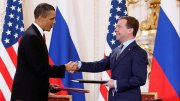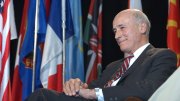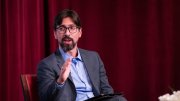Environmental scientists have concluded that China could meet its electricity needs through 2030 with wind power alone. In their study, the cover story in the September 11 issue of Science, lead author Michael McElroy, Butler professor of environmental studies, and colleagues from Tsinghua University, working as part of Harvard's China Project, conclude that a network of wind turbines operating at just 20 percent of their rated capacity could produce as much as seven times China's current consumption. China is currently second only to the United States in its national power-generating capacity, and is the world's fastest growing market for wind power. McElroy wrote a feature article for Harvard Magazine on the electrification of the United States's transportation infrastructure and the viability of wind power. His Harvard colleagues have also worked extensively on the problem of air pollution in China.
Wind Powering China
Wind Powering China
China could produce seven times its current electricity needs using wind alone.

You might also like
Five Questions with Matthew Bunn
The last treaty limiting nuclear arms buildup between Russia and the U.S. expires February 5. What’s next?
Mark Carney on the Limits of Soft Power
At the 2026 Davos summit, the Canadian prime minister echoes Harvard’s Joseph Nye.
Harvard Scholars Discuss Venezuela After Maduro
A Harvard Kennedy School panel unpacks the nation’s oil sector, economy, and democratic hopes.
Most popular
Explore More From Current Issue

Bees and Flowers Are Falling Out of Sync
Scientists are revisiting an old way of thinking about extinction.

What Bonobos Teach Us about Female Power and Cooperation
A Harvard scientist expands our understanding of our closest living relatives.






